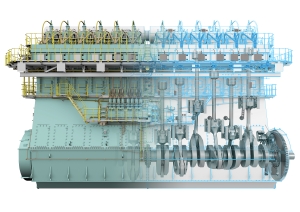


(Posted on 16/07/20)
Engine designer WinGD (Winterthur Gas & Diesel) has prioritised collaboration and transparency in its new cylinder lubrication guide, to ensure that selecting the right oil is easier than ever. For the first time, the new documentation provides ship operators with consolidated, at-a-glance information highlighting the specific usage conditions for each and every approved cylinder oil.
The guidance is the result of several months’ work with major oil companies to make usage requirements more transparent. Previously, the guidelines for each oil were found only in the industry standard No Objection Letters (NOL) issued by WinGD to oil companies, and available only upon request by a customer to an oil company directly. Now this information has been included in the full list of approved cylinder oils.
To find an appropriate cylinder oil, users first select a suitable Base Number (BN) range based on their fuel sulphur content. Customers then look through the guide to see which oil products fall within a specified BN range. The document then highlights whether each oil is approved for general, long-term use or whether further stipulations – such as a time limit or greater frequency of inspections - are required. An additional category, labelled as ‘DF validated’ shows whether the oil has passed a validation trial while burning gas as the predominant fuel during that trial.
"Cylinder oil is not just another consumable onboard – it’s considered an important engine component that ensures reliable operation,” says Frank Venter, WinGD Project Engineer Tribology Fuels & Lubricants. “Given the already wide variability in existing fuels available, it is important that engine companies and oil suppliers work together to offer clarity for ship operators about which oils can be used and how. This will become increasingly important as we embrace a decarbonised future with potentially multiple varied sources of both liquid and gaseous fuels.”
The development follows extensive work with oil majors in the run up to 2020 to ensure that cylinder oils could meet the challenges of new fuel types. The engine designer’s well-established validation procedure has identified many cylinder oils with a broad spectrum of properties (including BN) which are fit for operation with both low and high-sulphur fuels as well as for gas fuel operation.
The correct use of appropriate cylinder oil completes WinGD’s robust and well-proven tribological design concept. Its engines feature state-of-the-art cylinder lubrication systems combined with unique cylinder liner, piston and piston ring designs. These improve reliability and enable a long time between overhaul for combustion chamber components, ultimately resulting in more predictable and lower cost engine maintenance.
Rio Tinto’s first Pilbara-made iron ore rail car has rolled off the production line in Karratha... Read more
Precision meets progress at Phu My Port, Vietnam. The LPS 550 has been deployed to handle bulk commodities... Read more
bound4blue, a global leader in wind propulsion systems, has expanded its industrial footprint in Asia... Read more
As the industry explores multiple decarbonisation pathways, methanol is gaining attention as a practical... Read more
Technology group Wärtsilä will supply an integrated hybrid propulsion system for a bulk carrier... Read more
Superior Industries, Inc., a US-based manufacturer and global supplier of bulk material processing and... Read more
ESL Shipping has taken a significant step forward in digitalisation by deploying a new multichannel... Read more
Condition Monitoring Technologies (CMT) has deepened its presence across Asia’s most influential... Read more
After delivering its first full-scale seagoing project last week, Wattlab signed a contract at Europort... Read more
Steelpaint GmbH has reported strong growth in orders for corrosion protection coatings on Germany&rsquo... Read more